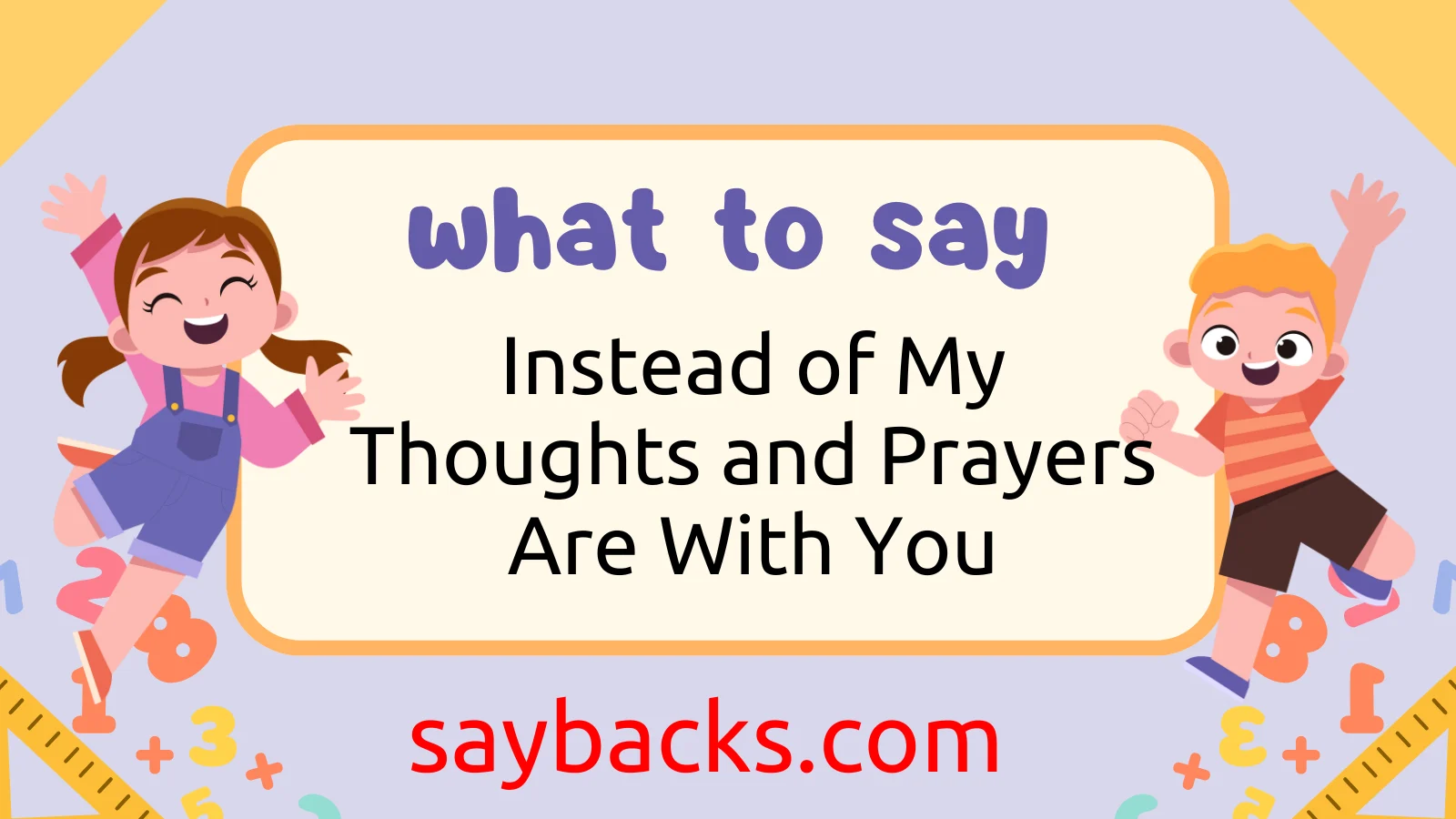The phrase “my thoughts and prayers are with you” is a well-known expression of sympathy and support during difficult times. However, in some situations, you may be looking for what to say instead of my thoughts and prayers are with you to offer more personalized, heartfelt, or specific comfort. Whether you want to be more inclusive, provide a deeper connection, or simply find a fresh way to express your sympathy, there are many meaningful alternatives that can resonate deeply with someone who is grieving or facing hardship.
In this article, we’ll explore some thoughtful phrases you can use in place of this traditional expression, providing you with a variety of options to help convey your compassion and support.
1. “I’m So Sorry for Your Loss”
A Classic and Direct Expression of Sympathy
One of the simplest and most heartfelt alternatives to “my thoughts and prayers are with you” is “I’m so sorry for your loss.” It’s a direct and empathetic way of acknowledging the person’s grief, showing that you care deeply.
Why It Works:
This phrase works well in almost any situation, whether someone has lost a loved one or is going through a difficult time. It’s straightforward, respectful, and doesn’t require a religious context, making it suitable for people with different beliefs.
2. “I’m Here for You, Anytime You Need”
Offering Your Support More Actively
Sometimes, a simple phrase like “I’m here for you, anytime you need” can feel more personal and tangible than offering thoughts and prayers. This statement reassures the person that they have your ongoing support and can rely on you for whatever they need, whether it’s emotional support or practical help.
Why It Helps:
By expressing that you are available whenever they need you, this phrase offers comfort in a more actionable way. It shows that you’re not just sending thoughts from afar but are ready to help with their immediate needs.
3. “Sending You Love and Strength During This Time”
A Heartfelt Alternative for Challenging Situations
If you want to offer warmth and positivity, “sending you love and strength during this time” is a compassionate alternative. This phrase doesn’t focus on religious connotations, but still conveys deep sympathy and encouragement for the person’s strength.
Why It Works:
This phrase can be comforting for those who may not resonate with prayer but still appreciate words of support. It shows you are sending them positive energy and emotional strength to get through tough times.
4. “I Can’t Imagine What You’re Going Through, But I’m Here for You”
Validating Their Pain and Offering Support
If someone is going through an especially difficult time, such as the loss of a loved one or a major life challenge, saying “I can’t imagine what you’re going through, but I’m here for you” is a great way to acknowledge their pain while offering your support.
Why It Helps:
This phrase works because it recognizes that you can’t fully understand their pain, but you still want to be there for them. It shows empathy without making assumptions about what they’re feeling, which can be comforting during times of grief.
5. “You’re in My Thoughts and I’m Here If You Need Anything”
A Balanced Alternative with Emotional and Practical Support
Another way to show support without using the traditional phrase is “you’re in my thoughts, and I’m here if you need anything.” This combines a heartfelt sentiment with a practical offer of help, creating a well-rounded expression of care.
Why It Works:
While it acknowledges the person is in your thoughts, this phrase adds the extra layer of being available to help, whether it’s listening or assisting with everyday tasks. It balances emotional support with real-world action, offering the person both comfort and reassurance.
6. “I’m Sending You Comfort and Peace During This Difficult Time”
A Calming and Soothing Expression of Support
If you want to offer an alternative to “my thoughts and prayers are with you” that focuses on emotional healing, “I’m sending you comfort and peace during this difficult time” is a great option. This phrase is gentle and calming, reminding the person that peace can come even during times of sorrow.
Why It Works:
This phrase is especially soothing for someone who is grieving or facing emotional challenges. It highlights the hope that they will eventually find peace, making it an encouraging message without minimizing the pain they may be feeling.
7. “Please Let Me Know If There’s Anything I Can Do to Help”
Offering Specific Help for Practical Support
If you want to offer more practical help rather than just emotional support, you can say, “Please let me know if there’s anything I can do to help.” This simple yet effective message shows that you’re not just offering empty words, but you’re ready to assist in concrete ways.
Why It Works:
This statement removes any ambiguity about your willingness to help. It provides a clear message that you’re available to support them in tangible ways, whether it’s helping with daily chores, bringing food, or offering a listening ear.
8. “Wishing You Strength and Healing”
A Short but Powerful Expression of Hope
If you’re looking for a concise alternative that conveys both emotional strength and hope, “wishing you strength and healing” is an excellent choice. It conveys a positive and supportive message without being overly wordy.
Why It Works:
This phrase is especially useful when you want to express encouragement for someone who is undergoing physical or emotional healing. It emphasizes the journey toward recovery and renewal, making it both hopeful and empathetic.
Final Thoughts: What to Say Instead of My Thoughts and Prayers Are With You
If you’re wondering what to say instead of my thoughts and prayers are with you, there are many meaningful alternatives that can convey your support in a more personalized or inclusive way. From expressing sympathy with “I’m so sorry for your loss” to offering practical help with “Please let me know if there’s anything I can do to help,” these alternatives allow you to offer comfort while respecting the individual’s beliefs and needs.
The most important thing is to speak from the heart. Sometimes, the simplest words can have the greatest impact, offering the grieving or distressed person the support and empathy they need.

